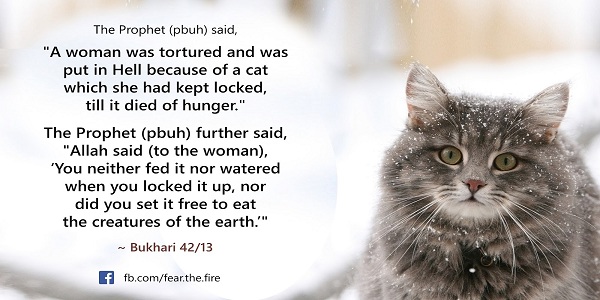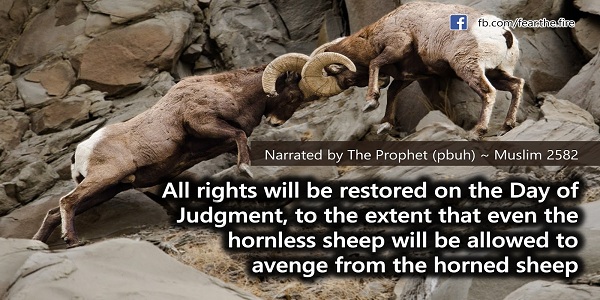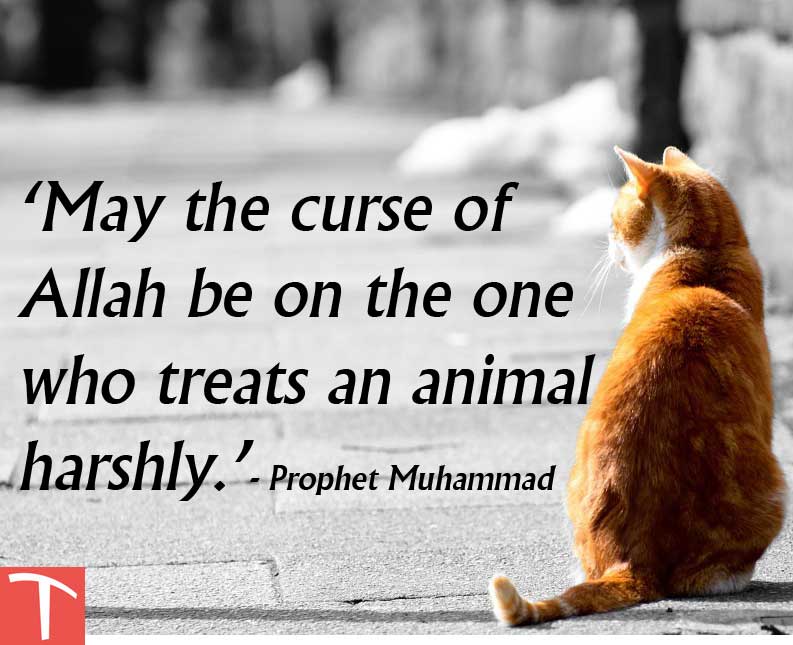Animals in Islam“ Be like a bee; anything he eats is clean, anything he drops is sweet and any branch he sits upon does not break.”
Ali, 4th Caliph
The Qur’an has over two hundred verses that deal with animals, along with six chapters that are named after animals. From the Qur’an, the teachings of the Prophet Muhammad and the narrations of the righteous leaders that came after him, a comprehensive legislative system regarding animals has been created.
The above narration shows us how some of the greatest men ever to walk upon the earth took lessons from the animal kingdom. The guidelines and rules were drawn up in a time when the rights of animals were abused, where animals were made to fight one another for fun, and they were hunted for sport.
We are told in the Qur’an how animals have been created as communities in their own right, with the ability to communicate with one another. The following verse illustrates that as indeed the human race is a community of needs, be they physical or mental, so the animal kingdom has certain needs too.
“And there is no creature on [or within] the earth or bird that flies with its wings except [that they are] communities like you…”
(Qur’an 6:38)
Islam has the view that man has authority over the animal kingdom, yet it is an authority that comes with responsibility;
“It is He who has made you successors upon the earth…”
Qur’an 35:39
The Qur’an tells us of the duty of animals, that they function in their roles and do as they have been commanded to perfectly, for you will find the bee producing honey, and incapable of producing milk, and in doing so fulfils the commands of God and worships Him alone.
“The seven heavens and the earth and whatever is in them exalt Him. And there is not a thing except that it exalts [Allah] by His praise, but you do not understand their [way of ] exalting…”

Qur’an 17:44
This verse shows us how things created in the natural environment follow the commands of God, and in doing so enact worship of God.
Islamic teachings discuss animal consciousness, and that they suffer from pain and pleasure, but unlike humans they do not have the ability to rationalise. Indeed a Dutch team of scientists discovered the release of endorphins in animals, caused by stress and pain.
It is because of this that humane treatment is obligatory, and an example of that is the manner in which we must cohabit with the animal kingdom. We must allow them to eat, and provide for those animals within our custody;
“Then let mankind look at his food – How We poured down water in torrents, then We broke open the earth, splitting [it with sprouts], and caused to grow within it grain and grapes and herbage and olives and palm trees and gardens of dense shrubbery and fruit and grass – [as] enjoyment [i.e., provision] for you and your grazing livestock.”
Qur’an 80:24-32
The verses from the creator in this respect are many, and reiterate how we must not only provide for animals, but look after the environment in such a way that protects both animals and plants. In destroying forests and polluting lakes, mannkind earns a great sin.
God tells us what happens to those who abuse this power and responsibility:
“We have certainly created man in the best of stature; Then We return him to the lowest of the low…”

Qur’an 95:4-5
The view of animals within Islam attains the perfect balance, for although we have the authority over animals, we must ensure the health and wellbeing of every living creature that exists alongside us. Animals have in part, been created to serve mankind. Touse their bodies for work, to drink their milk, to use their meat for sustenance, and to use the fur that is necessary, is all sanctioned within Islam as long as it is done so within strict guidelines.
“And indeed, for you in livestock is a lesson. We gave you drink from that which is
in their bellies, and for you in them are numerous benefits, and from them you eat.
And upon them and on ships you are carried.”
Qur’an 23:21-22
Treatment of Animals
Sa’id Ibn Jubair reported that Ibn Umar happened to pass by a party of men who had tied a hen and were shooting arrows at it. As soon as they saw Ibn Umar, they scattered from it. Thereupon Ibn Umar said:
“Who has done this? Verily Allah’s Messenger (may peace be upon him) has invoked curse upon him who does this.”
Muslim
To kill animals to satisfy the human thirst for trophies, completely goes against Islamic tradition. To kill animals for their fur and to use those in unnecessary areas such as floor coverings, or to kill animals to keep their heads upon walls is a cruelty to animals. To undertake unnecessary experimentation
for cosmetics or toiletries is against humane treatment of animals and is a disgrace. Blood sports have found the headlines within certain countries in the last few years, and are a problem within many countries. To hunt for amusement, to aim a weapon at an animal for fun, to cause injury for no other than gratification or tradition is simply prohibited in Islam, for the Prophet said:
“Do not set up living creatures as a target.”
Muslim
Hisham Ibn Zaid has narrated that when Anas saw some boys shooting at a tied hen, he said:
“The Prophet has forbidden the shooting of tied or confined animals.”
Bukhari
Animals as Food
Where there is a need to slaughter an animal, and the most common need for that in modern times is for food, then many guidelines have been set up to do so, for even this must be done in the most humane of manners. The animals that can be eaten are clearly defined, along with the prohibition on eating many types of meat. The manner in which to slaughter animals that are allowed to be eaten has been clearly prescribed and is lengthy. One such example of a guideline from the Prophet was where a man had put his leg on the neck of a sheep and had begun to sharpen his knife whilst the sheep looked on.
The Prophet asked:
“Why not before now? Do you want to kill her twice?”
At-Tabarani
Further Ali (the 4th Caliph) said:
“Do not slaughter sheep in the presence of other sheep, or any animal in the presence of other animals…”
This indicates the sense of mental care needed in this task, so for a greater reason the actual slaughter too has its rules, for the blade must be so sharp that oxygen fails to reach the brain within a few seconds, making the following process painless for the animal.
Prophet Muhammad saw a butcher grabbing a sheep by its leg as it tried to escape. He said,
“O butcher! Take it gently.”
Abdur-Razzaq
Also, Umar saw a butcher was grabbing a sheep by its leg and said,
“Take it to die gently.”
Abdur-Razzaq
Domestic Animals
Pets have a certain place within the faith and the domestication of certain animals is permitted. Cats are allowed to stay amongst the family as Prophet Muhammad said:
“They (cats) are not impure and they intermingle with you.”
Abu Dawood
Often when looking at the Muslim community, there is a perception about the hatred of dogs. We find with the rulings that dogs should generally be kept outside the house, yet that does not give one the right to neglect it, or mistreat it.
The usefulness of this creature of God is indisputable. No other animal can compete with it in terms of its loyalty to its caregiver, its abilities as a guard, and its talent for hunting. Throughout history you will find much evidence of dogs being used as hunting companions, bringing back food needed to sustain a family, or indeed to act as a guard in many different manners. Indeed they have been used in their loyal service of man for many years, and now with modern training as ‘seeing dogs’ for the blind, they are also used in this area of helping humans.
Summary
Animals in Islam. Islam permits the use of animals, the use of their strength and the use of their meat and skin where necessary. It is binding upon mankind to treat animals in a humane manner, and to treat those within one’s custody or outside one’s custody with care, humility and respect to not only their physical, but also their mental well being. Mistreatment of any part of nature, be it the animal kingdom or the destruction of the earth itself is a major sin, and condemned in Islam. An interesting factor is that these guidelines and comprehensive principles have existed for over 1400 years, unchanged, and an integral part of our way of life.
Source: https://islamhouse.com/en/articles/2783766/





How To Recover That Photo Picture Or File You Deleted Accidentally
On March 4, 2017 at 5:58 am
haha !!!!!! yes